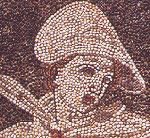Responding to my comments about my
favorite sculpture, Nicholas Provenzo
agrees with my praise for it, then he writes (in part):
"I recall that earlier this spring Sherri Tracinski attacked a similar sculpture by Daniel Chester French because it had wings and was allegedly named after a passage in the Holy Bible (a point that seems to be a matter of debate among art historians). Tracinski’s position was that French’s sculpture was an unreal representation of romantic love—and that no artist, save for Sandra Shaw has been able to accurately capture love in their art."
I located Tracinski's article online. (I believe I found the right one.) You can read it
here. In fact, I recommend it.
To be precise, Miss Tracinski never actually claims in her article that only Sandra Shaw has ever captured real, human love in art. I believe Tracinski meant to limit the context of her article to sculpture. Also, she says that she hasn't found such a sculpture, not that one doesn't exist. She writes, "It has taken me years to find in a piece of sculpture depicting love that was real, benevolent, and untainted by tragedy.[
sic]"
Having said that, I don't entirely agree with her critique.
Like her, I don't like the way that love is portrayed in Daniel Chester French's
The Sons of God Saw the Daughters of Man That They Were Fair (click
here). She writes, "nearly every piece [that I have found] depicts love as a physical action between two mythical figures or as a story of passionate doom," and I think she's right that French's sculpture exemplifies this message. But she assumes, I think wrongly, that the problem stems from the man's wings. She claims that the sculpture "shows us an otherworldly winged man in a passionate embrace with a very this-worldly woman."
True, the wings are huge and cannot be ignored; they virtually envelope the woman. But I don't consider that to be the most important problem with this piece. Here's where Tracinski and I part ways. She writes: "[French's piece] depicts a tender and passionate love, it isn't a real love." You're right, Miss Tracinski, it isn't real love. But it's also not a tender love, and even more than that, its passion is ironic.
Notice her rigid arm pushing away at his wing and her head held at a rigid, right angle away from him as if she aims to keep her "virtue" intact right up until she can no longer resist — even if she fully expects it to be taken. Notice that if she does not change her pose, it would be almost impossible for him to reach her lips. Notice that her leg blocks his thigh. Finally, notice that her eyes are focused, not on her suitor, but on heaven. This strikes me as an incredibly Victorian position. It says to me that this love is not conjugal. It's much too loaded with piety. While his passion is undeniably physical, her passion by contrast is directed at her own virtue, not her suitor.
That's why this sculpture conveys a "story of passionate doom." A more secular statue such as
Cupid and Psyche would be more inviting of human sexuality and emotional union. Take the wings away from French's statue so that only two humans remain, and what do you have? Still, a "story of passionate doom". The wings clearly distract, but that's not where the real message of this piece is coming from. It's the pose, especially that of the woman.
So that's my response to Tracinski. Now contrast French's sculpture with the one that I favored, Canova's
Cupid and Psyche (click
here). Notice how his wings stay up and away from the focus of the drama. If anything, they merely tell us who he is and from which direction he came. They don't encircle the woman or even attempt to frame the action. They're incidental to the moment. From the viewer's usual perspective, it is very easy to enjoy this sculpture while virtually ignoring the fact that the man has wings. You can see this more clearly
here (on Lee Sandstead's website).
But that's essentially beside the point. What's important is to contrast the mood in this sculpture with French's. Notice how, as I said, "[Psyche] reaches up for love. She touches him tenderly, bare of soul." What a vastly different perspective from French's rigid, Victorian-style maiden! Regarding Cupid, I earlier wrote "he lifts her head to his lips, and they unite in a circle beneath his hopeful gaze." By contrast, French's winged man cranes his head to kiss the woman who leans away from him.
In French's sculpture, a violent form of action seeks to take that which has been given to him, not by the woman, but by a higher power, while in Canova's sculpture, a lover fights alone for that which already belong's to him, and he wins it much to his dear lover's joy. Through Canova, we get to witness the exact moment when the lovers Cupid and Psyche reunite, a triumph of passionate, human values.
And this brings me to my final point: There's a crucial difference that I see between Canova's attitude toward the supernatural and French's. One distills his spiritual beliefs down to a divinely
human moment, the other to the human side of an otherwise
divine moment. (To further drive this point home, notice which of the two winged creatures rests upon an earthly stone, and which upon a cloud.)
I want to say more about the fantastic in art, but I'll have to save that discussion for later. In short, I have no problem with it, depending on the context and the treatment. My concerns mainly revolve around the issue of metaphysical value-judgments. What does an artist consider important? Answering that question is the key to focusing on the right elements when trying to make sense of — and better appreciate — any art, whether fantastic or purely realistic.
-Toiler
P.S. I think Daniel Chester French is an amazing sculptor. I may not like the theme of this particular piece, but I'm still in awe of it.
Labels: fine art


